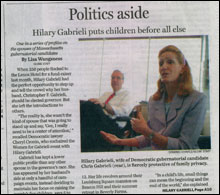
WHO’S IN CHARGE?: Time to show Gabrieli. |
Forget the Greens and Libertarians. It’s the Couch-Potato Party that will be the next alternative force in Massachusetts politics. At least that’s what Comcast is hoping. The cable provider is now “offering political candidates the chance to increase voter interest and understanding by posting video segments ON DEMAND.”First to post: Democratic lieutenant-governor hopeful Andrea Silbert, who made a strong, self-assured biographical video available throughout July. “We’re trying to break through the clutter,” said campaign manager Christy Mach. “Citizens are choosing media at a time and place convenient to them.”
And how many citizens chose to watch Silbert’s video? “We had over one thousand unique viewers, actually closer to fifteen hundred,” Mach said. At $3900 for the month, that’s about three bucks a pop — a little steep, perhaps, but those viewers, as they say, were cherce.
Since Silbert signed on, the ranks of On Demand candidates have swelled to … none. Stephen Flaim, vice-president of Comcast’s Boston-advertising division, said they’ve approached a majority of the major candidates and found them “very intrigued.” He added that On Demand video segments are “a unique way to get beyond the thirty-second spot and an opportunity to talk about things that are important.”
For perspective, we turned to our Decision ’06 Dartboard©, which determines which candidate to call in situations like this. It turned out to be Christy Mihos’s lucky day. “We were pitched by Comcast, but it’s not something we’re currently looking toward,” said Nicole Nionakis, press secretary for the independent gubernatorial candidate. “We might consider it in the future.”
As for the standards that prevail at On Demand, Comcast executive Jane Bowman said in a statement, “Comcast … reviews all advertising, including advertising distributed via Video on Demand, for compliance with network and internal guidelines.”
Then again, Comcast officials concede that cable networks can’t censor political ads, and they declined to discuss their “internal guidelines.”
As Raymond Chandler might say, thinner than the gold on a weekend-wedding ring.
Murder mystery at the Boston Globe
Last week the Boston Globe ran a front-page profile of gubernatorial candidate Chris Gabrieli’s wife, Hilary, which included a Raymond Chandler–worthy tale about the apparent 1974 murder of her father, Edwin Conant Bacon, by his business partner. The Globe story also included this:
“Gabrieli declined to discuss her father’s death. She and her husband vehemently objected to its mention in this story, saying they were not ready to discuss the details of it with their children.”
The request was fair enough, seeing as how the murder doesn’t have all that much to do with how Gabrieli would perform as governor — unless, of course, Edwin Conant Bacon’s former partner’s heirs have legislative business on Beacon Hill. Go figure the odds of that.
But was it fair for the Globe to report the couple’s request, which potentially made them look ineffectual on two levels, political and parental?
Globe political editor David Dahl responded, “Campaigns always try to shape coverage.” Exactly. That kind of request occurs all the time. So why report this one? “We appreciated their concern,” Dahl said. While the episode was tragic, “it was a big part of her life.”